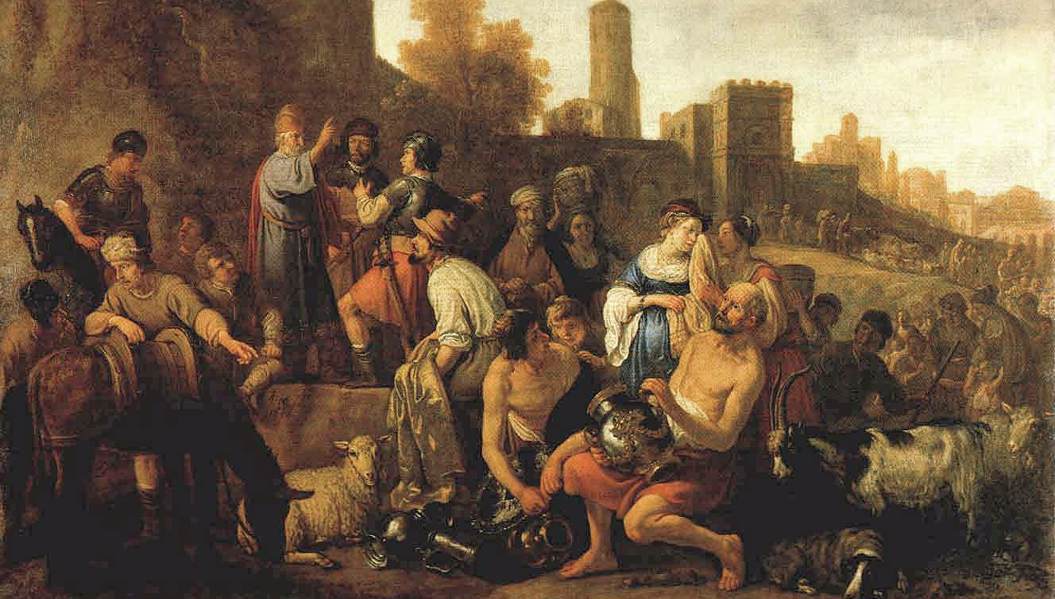Commentary on Parashat Matot, Numbers 30:2 - 32:42
The child in me wants to hide Parashat Matot and Parashat Masei in a dusty attic somewhere; so many of their words are disillusioning, disturbing, and embarrassing. Parashat Matot begins with sexism: all men must keep their promises, yet women’s promises may be nullified by disapproving husbands and fathers (Numbers 30). It continues with genocide: In a spirit of revenge, thousands of Israelites invade Midian and kill every man (Numbers 31:7). When they return with captured women, children, and booty, Moses is angry because his soldiers did not do enough. He commands them to kill every non-virgin female and every male child among the captives (Numbers 31:15-18).
This massacre is especially bloodcurdling for those who remember that Moses lived in Midian for a period of his life and that his wife Zipporah and father-in-law Jethro are Midianites. Later, Parashat Masei foreshadows a horrific mission of ethnic cleansing in Canaan: God commands the People of Israel:
You shall dispossess all the inhabitants of the land…And if you do not dispossess the inhabitants of the land, those whom you allow to remain shall be stings in your eyes and thorns in your sides. (Numbers 33:52-55)
How can we meaningfully engage with such indigestible texts that blatantly contradict our contemporary notions of justice? How do we continue to embrace the and proclaim that “all her paths are shalom (peace)”? (Proverbs 3:17)
Wholeness in the Torah
Many people choose to evade, rather than to connect intimately with these difficult issues. Some attempt to “purify” problematic passages through creative interpretations and apologetics. Midrash, for example, is a wellspring of such commentaries. Others ignore the problematic texts and focus exclusively on passages that validate their own personal values. Although these two methods sometimes lead to profound commentaries, they ultimately limit the depth of our engagement with Torah. Whether we justify its faults or we fail to behold its wholeness, we, and Torah, are fragmented.

Help us keep Jewish knowledge accessible to millions of people around the world.
Your donation to My Jewish Learning fuels endless journeys of Jewish discovery. With your help, My Jewish Learning can continue to provide nonstop opportunities for learning, connection and growth.
Rather, we must approach the whole Torah with open hearts, displaying enough patience and tenderness to remain in close relation to all of it, even amidst conflict and vulnerability. To look upon its beauty and blemishes, to engage with Torah openly and honestly is to cultivate real and sustainable –the kind that can exist within individuals, in a society, and between nations.
“Peace” is a misleading translation of shalom, for it implies a lack of conflict, an absence of complications. In fact, the etymological root of shalom is shalem –“whole.” Shalom is not a state of calm; it is wholeness — a process of opening oneself to the whole story and grappling with it. Thus, shalom is not peace itself, but the headwater of peace. When we avoid complexity and strive for a black-and-white understanding of reality, we erode the possibility of shalom. Seeing and struggling with the Torah’s most disturbing faces — even when it elicits emotional responses like shame, anger, and sadness — can actually elucidate our deepest values and can help us identify our own ethical and moral orientations. Our productive indignation over unjust texts motivates us to take action on these issues in our own lives.
Wholeness in the World
The pursuit of global justice requires us to apply this notion to the world itself. We should strive to be aware of what is happening around the globe–the pleasant and the tragic, the heartwarming and the chilling. It can be excruciating to learn about the oppression, poverty, and epidemics that persist every day. This is why so many of us turn away. How else could the genocide in Darfur possibly have gone on without a stronger degree of international intervention? How else could millions of human beings die of hunger every year while others of us have excess? How else could diarrhea, the most preventable and treatable childhood illness, kill 4,000 children per day? If we skip over those painful “texts” in newspapers and on the news, if we choose ignorant bliss over actual awareness, then we stunt the growth of shalom. And where there is no shalom, there can be no peace.
To practice shalom in the world, we must extend beyond a passive awareness of international issues. It is relatively easy for us to learn about and respond emotionally to events, but knowledge without action falls short of wholeness. Our real challenge is to integrate our intellectual and physical selves, to rise up and do something once we are aware. The world will not change, and neither will we, if we sit still, steeped in thoughts and feelings.
It may seem easier in the short term to ignore complexities, but this alienates us from reality. To neglect shalom weakens us as activists and undermines the wholeness of Torah, the world, other people, and ourselves.
Here we conclude the Book of Numbers, Bamidbar, “In the Wilderness.” The People of Israel stands on the banks of the Jordan, in the final days of their wanderings. They yearn to enter Jerusalem, Yerushalayim — another word rooted in shalem, wholeness. Like them, we still need to gaze across the waters, to find our way, to move ever closer to justice and to peace.
Provided by special arrangement with American Jewish World Service. To learn more, visit www.ajws.org.



